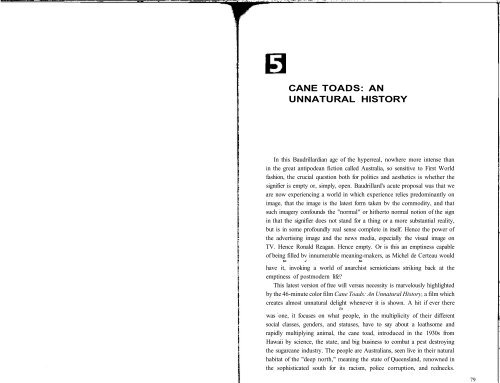The Nervous System - Department of English and Comparative ...
The Nervous System - Department of English and Comparative ...
The Nervous System - Department of English and Comparative ...
Create successful ePaper yourself
Turn your PDF publications into a flip-book with our unique Google optimized e-Paper software.
79<br />
CANE TOADS: AN<br />
UNNATURAL HISTORY<br />
In this Baudrillardian age <strong>of</strong> the hyperreal, nowhere more intense than<br />
in the great antipodean fiction called Australia, so sensitive to First World<br />
fashion, the crucial question both for politics <strong>and</strong> aesthetics is whether the<br />
signifier is empty or, simply, open. Baudrillard's acute proposal was that we<br />
are now experiencing a world in which experience relies predominantly on<br />
image, that the image is the latest form taken bv the commodity, <strong>and</strong> that<br />
such imagery confounds the "normal" or hitherto normal notion <strong>of</strong> the sign<br />
in that the signifier does not st<strong>and</strong> for a thing or a more substantial reality,<br />
but is in some pr<strong>of</strong>oundly real sense complete in itself. Hence the power <strong>of</strong><br />
the advertising image <strong>and</strong> the news media, especially the visual image on<br />
TV. Hence Ronald Reagan. Hence empty. Or is this an emptiness capable<br />
<strong>of</strong> being filled bv innumerable meaning-makers, as Michel de Certeau would<br />
to J to<br />
have it, invoking a world <strong>of</strong> anarchist semioticians striking back at the<br />
emptiness <strong>of</strong> postmodern life?<br />
This latest version <strong>of</strong> free will versus necessity is marvelously highlighted<br />
by the 46-minute color film Cane Toads: An Unnatural History, a film which<br />
creates almost unnatural delight whenever it is shown. A hit if ever there<br />
to<br />
was one, it focuses on what people, in the multiplicity <strong>of</strong> their different<br />
social classes, genders, <strong>and</strong> statuses, have to say about a loathsome <strong>and</strong><br />
rapidly multiplying animal, the cane toad, introduced in the 1930s from<br />
Hawaii by science, the state, <strong>and</strong> big business to combat a pest destroying<br />
the sugarcane industry. <strong>The</strong> people are Australians, seen live in their natural<br />
habitat <strong>of</strong> the "deep north," meaning the state <strong>of</strong> Queensl<strong>and</strong>, renowned in<br />
the sophisticated south for its racism, police corruption, <strong>and</strong> rednecks.
















